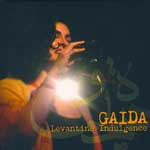Gaida’s debut CD comes after years of attending Arabic jam sessions in New York, where she impressed and then collaborated with great and adventurous players like Najib Shaheen (Simon’s brother and a brilliant oud player), percussionist Johnny Farraj, and Iraqi-American trumpeter and santoor player Amir ElSaffar, with whom Gaida developed a hybrid of Arabic and jazz approaches to composition and improvisation. All that and a nimble and lissome voice make this one of the most satisfying Arabic music releases I’ve come across in awhile.
At its best, the fusion of styles here is subtle—a trumpet line meandering through the jangle of oud and qanun string melodies on “Dream,” the way qanun bleeds into piano during the extended instrumental solos on “Indulgence,” or the way this rich, at times dense-sounding ensemble pares down nearly nothing when Gaida sings, just as a really sensitive jazz ensemble would do for its featured vocalist.
Gaida sets an Arabic vocal to a straight-up bossa nova on “Illak Shi,” and echoes the mood and lyricism of “My Funny Valentine” on her Arabic jazz ballad “Kaifa Uhibuka.” Amazingly, neither song feels forced or awkward. “Ghayeb,” a somewhat melodramatic jazz hybrid, is more self-conscious, and less successful, but still heartfelt and impressive. Elsewhere, Gaida and her fine ensemble deliver lively adaptations of distinctly Arabic styles. “Ammar,” a song written for a brother’s wedding, brings in the wail of village celebration. “Almaya” has the tuneful levity of an Andalusian song. And on the long and leisurely “Salam Min Dimashq,” Gaida ventures into Umm Kulthum territory, revealing tremendous depth and passion in her steadily intensifying vocal. This is an artist with the chops and sensitivity to make Arabic art music both comprehensible and exciting to American listeners—no easy task.
-Banning Eyre










